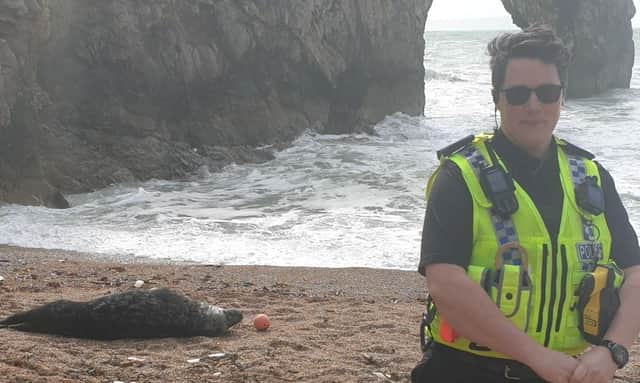Seal safety: Safety tips for encountering sunbathing seals - after police close off Dorset beach
This article contains affiliate links. We may earn a small commission on items purchased through this article, but that does not affect our editorial judgement.


Police closed off a beach near one of Dorset’s most famous landmarks this week, to make sure the public gave a sunbathing seal space.
In a Facebook post, a Wareham Police spokesperson said they were called to Durdle Door on Wednesday afternoon (3 April), “to put a seal on crime”. “The sun finally shone this afternoon, inviting a beautiful seal to Durdle Door beach for an afternoon of relaxation through the Easter holidays,” the force said.
Advertisement
Hide AdAdvertisement
Hide Ad“Police were called to cordon a section of beach off to keep a safe distance between the public and the seal. This also provided the seal with enough space to feel comfortable and avoid him getting stressed. As you can see, he did just that,” they continued.
The move was praised by the public on social media, with posters saying they were pleased the marine mammal was left alone - and got the peace and quiet he was after. Others, however, raised concerns about how close people had been getting to the creature, before police stepped in.
With the common seal pupping season - where mothers and their pups will become a regular presence on British beaches - only a few months away now, here’s what the National Trust advises you do if you would like to watch seals.
Sharing the beach with seals safety
The British Isles are home to both grey and common seals, and although they are a frequent sight here, they are rarer across much of the world - making the UK’s population globally significant, and in need of our protection.
Advertisement
Hide AdAdvertisement
Hide Ad‘Seal season’ lasts from around late May to early June through to September for common seals, and this is when more seals will spend their time on the beach, often forming large colonies. For grey seals, pupping season runs from November to January.
If you’d like to watch the seals, the National Trust says you should approach them considerately - always aiming to arrive and leave without them noticing you. You should walk slowly and quietly, and whisper instead of talking. Choose a spot to watch that’s at not too close (at least 100 metres away, according to RSPCA welfare guidelines). You can use binoculars if you’d like to see them more closely without bothering them. “Please avoid taking your photo with any seals as you may disturb protective females and territorial males, which could result in injury,” the Trust adds.
If you see signs that the seals are nervous or disturbed by your presence, you should quietly move away. It also advises leaving your dogs at home if possible, or at the very least keep them on a short leash far away from any seals you can see, as dogs can cause their aquatic cousins a lot of stress.
Finally, the National Trust’s guidance says not to be alarmed if you see pups on their own - even if they’re crying - as their mothers often leave them alone for a while as they return to the sea to feed. “Please keep your distance and do not attempt to move any seal yourself,” it says.
If a seal has a visible injury, you can call British Divers Marine Life Rescue (BDMLR) on 01825 765546.
Comment Guidelines
National World encourages reader discussion on our stories. User feedback, insights and back-and-forth exchanges add a rich layer of context to reporting. Please review our Community Guidelines before commenting.
